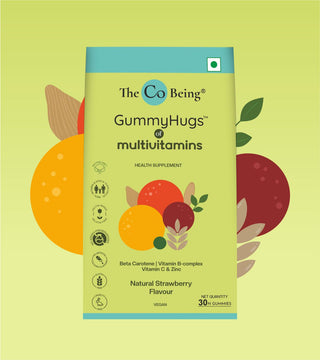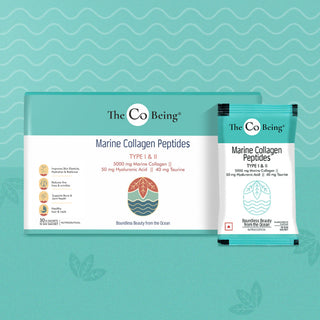What are Essential and Non-Essential Fatty Acids | Major Health Benefits of Omega 3-6-9 | Foods that Contain Omega 3-6-9 | Key Takeaways
We’ve been hearing about the role of “Omegas” in our daily diet for quite some time. But what are Omega-3-6-9 fatty acids, and why are they regarded as superfoods?
Omegas are categorized as fatty acids. Fatty acids can be grouped into four main types - trans fats, monounsaturated fats, polyunsaturated fats, and saturated fats. These are further classified as essential and non-essential fatty acids.
What are Essential and Non-Essential Fatty Acids?
The major difference between essential and non-essential fatty acids is that the human body can procure non-essential fats directly from the food we eat, whereas, essential fatty acids are those fats that have numerous benefits on bodily functions and need to be procured externally. These are not produced in the body.
While unhealthy meals like those that are extensively processed or deep-fried include trans fats and saturated fatty acids, which can harm your body when consumed in large quantities, there are other types of good fats that are excellent for you and necessary for the body to function properly. These are frequently referred to as “healthy” fats as well. Scientists recognize numerous benefits of omega 3-6-9 and regard these as essential fatty acids.
Your body can produce omega-9 fats and you can easily obtain them from your day-to-day diet, so you don’t need to take them in supplement form.
Our cells require omega-9 fatty acids to function properly. They aren’t regarded as nutritional necessities, as the body is capable of producing them on its own. Nutritionists consider olive oil, several other plant oils, some nuts, and seeds as heart friendly foods that should be part of a balanced diet since they contain omega-9 fatty acids.
Major Health Benefits of Omega 3-6-9
1. Improves Heart Health
Research shows that one of the greatest benefits of omega 3-6-9 is that they reduce your risk of heart disease. Foods that contain omega-3 help manage cholesterol, triglyceride, and blood pressure levels in the body and are often referred to as heart friendly foods!
2. Helps with Healthy Weight Loss
When combined with regular exercise, omega-3 fatty acids aid in weight management by shedding body fat. Moreover, food sources of omega-3 fats like fish oil, etc. help in weight management by increasing your body’s metabolism rate.
3. Helps with Inflammation
One of the most notable benefits of omega 3-6-9 is the significant role they play in the body’s inflammatory response, which can have a good impact on cardiovascular and joint health as well as overall health.
You could try out The Co Being’s “Healthy Heart” combo that comprises beta glucan gummies that will aid in bringing your cholesterol and blood sugar levels under control while also boosting your immunity. Couple it with the omega-rich flax max capsules available in this combo and cater to your heart, joints and overall wellness requirements.
4. Improves Cognition
Omega-3 fatty acids, which also aid in improving mood and memory, protect from the cognitive decline of the brain.
5. Helps with Digestive Issues
If you have trouble breaking down your food, then good fats like omega 3-6-9 are a must-have in your daily diet.
6. Overall Well-Being
Omega 6 foods like sunflower and sesame oil have a multitude of health benefits like stimulating hair and skin growth, improving metabolism rate and improving bone health and also maintaining good reproductive health.
Now that we know about the major benefits of omega 3-6-9 and why we need to consume them on a regular basis, let us learn about some monounsaturated and polyunsaturated fat examples that should be a part of our regular diet. We will also learn about some food sources of omega 3-6-9 and other heart friendly food.
Foods that Contain Omega-3 Fats
Now that you know the benefits, you must be wondering how to consume them!
One of the best sources of healthy fats is seafood. Cod, herring, krill, mackerel, salmon, sardines, tuna, oysters, and anchovies are some great polyunsaturated fat examples
For those who are looking for plant-based or diary-based monounsaturated and polyunsaturated fat examples:
- Oils: canola, flaxseed, and soybean oils. Meals enriched with Omega-3 (like eggs, yoghurt, juices, and milk)
- Nuts and seeds: flaxseeds, walnuts, and chia seeds are some vegetarian omega-6 foods that are readily available around you
Well if you find it difficult to procure these good fats naturally, we at The Co Being can provide you with a natural and vegan omega supplement- Flax Seeds.
A plant-sourced alternative to fish oil, flaxseeds have proven to be a potent powerhouse food packed with heart-healthy benefits.
And while they may seem like such tiny seeds, don’t let their small size fool you- they are arguably one of the best sources of healthy fats!
Combination Omega-3-6-9 supplements typically offer each of these fatty acids in the recommended ratios, such as 2:1:1 for Omega-3:6:9.
The Co Being’s FlaxMax capsules contain the goodness of flaxseed extract which is rich in omega 3-6-9.
Just 2 capsules a day will help you reap the benefits of omega 3-6-9, a super ingredient that improves cognition and heart health. It is also great for your skin and helps with inflammation. Our PhytoplanetTM blend is effective and safe and has anti-ageing properties.
Key Takeaways
Benefits of omega 3-6-9 can be gauged particularly in their capacity to support heart health, according to research. This is because choosing these healthy fats over saturated fats lowers your consumption of dietary cholesterol. All three of these beneficial unsaturated fats are necessary, but the mix of Omega-3, Omega-6, and Omega-9 in your diet is crucial.
You must obtain Omega-3 and Omega-6 necessary fatty acids from diet or supplements because your body cannot generate them. Omega-9 is a non-essential fatty acid because your body can generate it, yet it’s still significant for your health.
Only you know what you need best. It’s time you take that step and upgrade your well-being!



